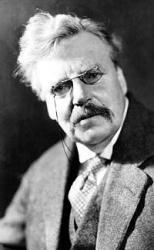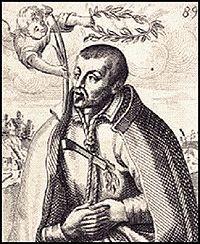Planning worship?
Check out our sister site, ZeteoSearch.org,
for 20+ additional resources related to your search.
- |
User Links
Person Results
Anonymous
Person Name: Anonima Composer of "IN DER WIEGEN" in TTT-Himnaro Cigneta In some hymnals, the editors noted that a hymn's author is unknown to them, and so this artificial "person" entry is used to reflect that fact. Obviously, the hymns attributed to "Author Unknown" "Unknown" or "Anonymous" could have been written by many people over a span of many centuries.
Anonymous
G. K. Chesterton

1874 - 1936 Person Name: Gilbert Keith Chesterton Author of "Ĉe-sine kuŝas Krist' la Beb'" in TTT-Himnaro Cigneta Chesterton, Gilbert Keith, son of Edward Chesterton, was b. May 29, 1874, at Campden Hill, Kensington. London; and is a well-known journalist and author, now (1906) residing at Battersea Park, London. He contributed to The English Hymnal, 1906, a vigorous lyric beginning, "O God of earth and altar"(Prayer for the Nation). [Rev. James Mearns, M.A.]
--John Julian, Dictionary of Hymnology, New Supplement (1907)
=================
Gilbert Keith Chesterton was born in London, England on the 29th of May, 1874. Though he considered himself a mere "rollicking journalist," he was actually a prolific and gifted writer in virtually every area of literature. A man of strong opinions and enormously talented at defending them, his exuberant personality nevertheless allowed him to maintain warm friendships with people--such as George Bernard Shaw and H. G. Wells--with whom he vehemently disagreed.
Chesterton had no difficulty standing up for what he believed. He was one of the few journalists to oppose the Boer War. His 1922 Eugenics and Other Evils attacked what was at that time the most progressive of all ideas, the idea that the human race could and should breed a superior version of itself. In the Nazi experience, history demonstrated the wisdom of his once "reactionary" views. His poetry runs the gamut from the comic "The Logical Vegetarian" to dark and serious ballads.
Though not written for a scholarly audience, his biographies of authors and historical figures like Charles Dickens and St. Francis of Assisi often contain brilliant insights into their subjects. His "Father Brown" mystery stories, written between 1911 and 1936, are still being read and adapted for television.
His politics fitted with his deep distrust of concentrated wealth and power of any sort. Along with his friend Hilaire Belloc and in books like the 1910 What's Wrong with the World he advocated a view called "Distributism" that is best summed up by his expression that every man ought to be allowed to own "three acres and a cow." Though not known as a political thinker, his political influence has circled the world. Some see in him the father of the "small is beautiful" movement and a newspaper article by him is credited with provoking Gandhi to seek a "genuine" nationalism for India. Orthodoxy belongs to yet another area of literature at which Chesterton excelled. A fun-loving and gregarious man, he was nevertheless troubled in his adolescence by thoughts of suicide. In Christianity he found the answers to the dilemmas and paradoxes he saw in life. Other books in that same series include his 1905 Heretics and its sequel Orthodoxy and his 1925 The Everlasting Man.
Chesterton died on the 14th of June, 1936 in Beaconsfield, Buckinghamshire. During his life he published 69 books and at least another ten have been published after his death. Many of those books are still in print.
--www.ccel.org/ccel/
G. K. Chesterton
Walford Davies

1869 - 1941 Person Name: H. Walford Davies Arranger of "CAROL" in Christian Science Hymnal (Rev. and enl.)
Walford Davies
Martin Shaw

1875 - 1958 Person Name: Martin Shaw, 1875-1958 Harmonizer of "IN DER WIEGEN" in The New English Hymnal Martin F. Shaw was educated at the Royal College of Music in London and was organist and choirmaster at St. Mary's, Primrose Hill (1908-1920), St. Martin's in the Fields (1920-1924), and the Eccleston Guild House (1924-1935). From 1935 to 1945 he served as music director for the diocese of Chelmsford. He established the Purcell Operatic Society and was a founder of the Plainsong and Medieval Society and what later became the Royal Society of Church Music.
Author of The Principles of English Church Music Composition (1921), Shaw was a notable reformer of English church music. He worked with Percy Dearmer (his rector at St. Mary's in Primrose Hill); Ralph Vaughan Williams, and his brother Geoffrey Shaw in publishing hymnals such as Songs of Praise (1925, 1931) and the Oxford Book of Carols (1928). A leader in the revival of English opera and folk music scholarship, Shaw composed some one hundred songs as well as anthems and service music; some of his best hymn tunes were published in his Additional Tunes in Use at St. Mary's (1915).
Bert Polman
Martin Shaw
Violet Spiller Hay
1873 - 1969 Person Name: V. H. Author of "All glory be to God most high" in Christian Science Hymnal (Rev. and enl.) Hay, Violet Spiller. (1873--1969). She married Commander the Hon. Gerald Hay in Cape Town, South Africa. She was a Christian Science practitioner and teacher, 1902-1969. She was chair of the committee for the Christian Science Hymnal, 1928-1932, and a committee member through 1955. She published a book of solos, and a book of poems.
--Joan E. Wilson, DNAH Archives
Violet Spiller Hay
Robert Southwell

1561 - 1595 Person Name: Robert Southwell, c.1561-1595 Author of "Behold a Silly Tender babe" in The Cambridge Hymnal Southwell, Robert, was b. at Horsham St. Faith, Norfolk, about 1561, educated at Paris and at Rome, and entered the Society of Jesus at Rome, Oct. 17, 1578. He spent part of his noviciate at Tournai in Belgium, but returned to Rome and completed his studies there. After being ordained priest in 1584, he returned to England in 1586. He was arrested in 1592 on the charge of high treason, committed to the Tower of London, formally tried at Westminster, Feb. 21, 1594-5, and executed the next day at Tyburn.
His Poetical Works were collected in 1856 by W. B. Turnbull, and re-edited in 1872 more completely and more carefully by Dr. A. B. Grosart, from the Add. manuscript 10422 in the British Museum, from a manuscript, perhaps autograph, at Stonyhurst College, Lanes., and from the printed editions of the individual works. One of his carols is noted at p. 210, ii., one of his translations at p. 663, ii., three additional are in the Arundel Hymns, 1902. They are all in Grosart's edition and are here cited as they are found in the Add. 10422, the spelling being preserved:—
1. As I in hoarie winters nyght. [Christmas]. At f. 10 b. This is the admirable poem entitled "The Burning Babe."
2. Behoulde a seelie tender Babe. [Christmas.] At f. 11. See p. 210, ii.
3. In Paschall fest, ye ende of auntient rite. [Holy Communion.] At f. 17 b.
4. Let folly prayse that phaney loues. [Christmas.] At f. 9. The Arundel reads "what fancy loves."
5. Prayse, 0 Syon, prayse, prayse thy Saviour. At f. 16. From the "Lauda Sion," p. 663, ii.
See also notices in the Month for Oct. 1894, and Feb. and March 1895, and in the Dublin Review, Oct. 1903. [Rev. James Mearns, M.A.]
--John Julian, Dictionary of Hymnology, New Supplement (1907)
Robert Southwell
Paul England
1863 - 1932 Translator of "A babe lies in the cradle" in The Hymnal of the Protestant Episcopal Church in the United States of America 1940
Paul England
Steuart Wilson
1889 - 1966 Person Name: J. Steuart Wilson Author of "Come see this little Stranger" in The Church and School Hymnal Wilson, Sir (James) Steuart; b. 22 July 1889, Clifton, England, d. 18 Dec. 1966, Petersfield, England; tenor, administrator, and song translator.
LOC Name Authority File
Steuart Wilson


 My Starred Hymns
My Starred Hymns


